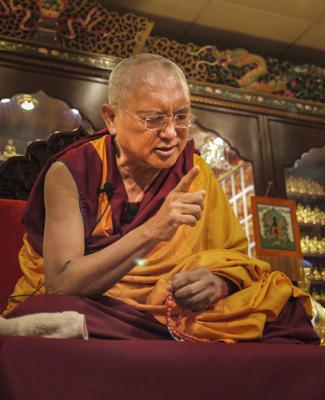The Index Page provides an outline of the topics discussed in each of the lectures. Click on the links below to go directly to a particular lecture.
Please note: As the tapes were not dated, the lecture dates are approximate.
Lecture 1: The Essence of Buddhism is Compassion
- The perfect human rebirth makes the most of this time
- Visualization of the merit field
- Believing the hallucination of I, action and object is the root of suffering
- The essence of Buddhism is compassion
- Universal responsibility
- The least we can do is stop killing
- The need for compassion
- Dedication
Lecture 2: Buddha Nature
- The lineage lama prayer is tantra
- Our delusions are not one with our buddha nature
- We can develop the infinite qualities of a buddha
- Attachment to this life brings dissatisfaction
- With attachment to this life everything is nonvirtue
- Attaining realizations takes a long time
- Karma: The four suffering results of sexual misconduct
- How often each day do we commit the ten nonvirtues?
- Living in the vows we collect merit continuously
- The merit of keeping one vow is greater than making offerings to all the buddhas
- Oral transmission of the Thirty-Five Buddhas and the Seven Medicine Buddhas
- Dedication
Lecture 3: The Thirty-five Buddhas
- Lineage lamas prayer commentary: The Kadampas
- Attachment is expensive
- Helping others materially is not enough
- The best help is to educate in virtue
- Without positive karma there can be no happiness
- Four things needed for success
- The five types of defeats in breaking vows
- The benefits of prostrating to the Thirty-Five Buddhas
- The meaning of the names of the Thirty-Five Buddhas
- What’s more terrifying, hell or creating negative imprints?
- The meaning of the names of the Thirty-Five Buddhas (Back to)
- Rejoicing in nonvirtue and in virtue
- The meaning of the names of the Thirty-Five Buddhas (Back to)
Lecture 4: Actualizing the Complete Path
- The Requesting Prayer to the Lineage Lamas
- Serkong Dorje Chang
- Seeing the guru as a buddha
- For enlightenment we need the whole path
- Atisha brings Dharma to Tibet
- The lamrim shows the entire path
- The importance of motivation: Four people recite Tara prayers with different motivations
- The importance of motivation: The tantric practitioner who becomes a hungry ghost
- We need to renounce all three realms
- As humans we can understand the cause of happiness
- Meditation on mind as creator
- Meditation on emptiness: We label and believe the label
- Dedication
Lecture 5: THe Door to All Happiness
- We are one, others are countless
- The heat of the hells
- Using problems to generate bodhicitta
- We are one, others are countless (Back to)
- Rinpoche and Montana fish
- The dictator of self-cherishing tells us we are the most important
- Working for others is the door to all happiness
- The disadvantages of self-cherishing
- The minute we cherish others there is peace
- Dedication
Lecture 6: Refuge and Bodhicitta
- The five paths
- After nirvana an arhat is awakened to bodhicitta
- The kindness of others
- Resultant refuge depends on causal refuge
- Remember the wheel of life when we recite refuge
- The suffering of change
- Pervasive compounding suffering
- We get enlightened for all sentient beings
- Mahayana refuge has three causes
- Dedication
Lecture 7: Taming the Mind
- Refuge is an inner change
- The significance of the robes: Subtle impermanence
- We hallucinate a permanent, inherent I
- With emptiness we see everything as like a dream
- The significance of robes: We are in the jaws of the Lord of Death
- The unification of emptiness and dependent arising
- The four noble truths and the Buddha, Dharma and Sangha as doctor, medicine and nurse
- The twelve links and the Rice Seedling Sutra
- The twelve links: The three delusions, two actions and seven results
- Everything comes from the mind
- Dedication
Lecture 8: Everything Exists in Mere Name
- Seeing the pillar depends on labeling the pillar
- Even atoms only exist in mere name
- The oral transmission of Shakyamuni practice: The importance of vows
- The oral transmission of Shakyamuni practice: The preciousness of the perfect human rebirth
- The oral transmission of the lamrim prayer: The lamrim is the essence of the Dharma
- Dedication
Lecture 9: The Path to Cessation
- How can we be free from delusions?
- Geshe Jampa Wangdu
- The eight benefits of prostrations
- Prostrating to holy objects
- The benefits of having holy objects at home
- We need all three objects of refuge to be free from samsara
- The importance of vows
- The refuge ceremony
Lecture 10. The Power of the Holy Object
- The power of the object
- The power of the object: The pig who was reborn in a pure realm
- The power of the object: The fly on the dung
- The power of the object (Back to)
- To practice renunciation in the West, reflect on the entire lamrim
- Dedication
Lecture 11: Prostrations to the Thirty-five Buddhas
- An extensive bodhicitta motivation from the refuge prayer
- The Thirty-five Buddhas and the four powers
- Khunu Lama Rinpoche
- The meaning of the prostration mudra
- Prostrating
- Ways of doing the Thirty-five Buddhas practice
- Dedication































